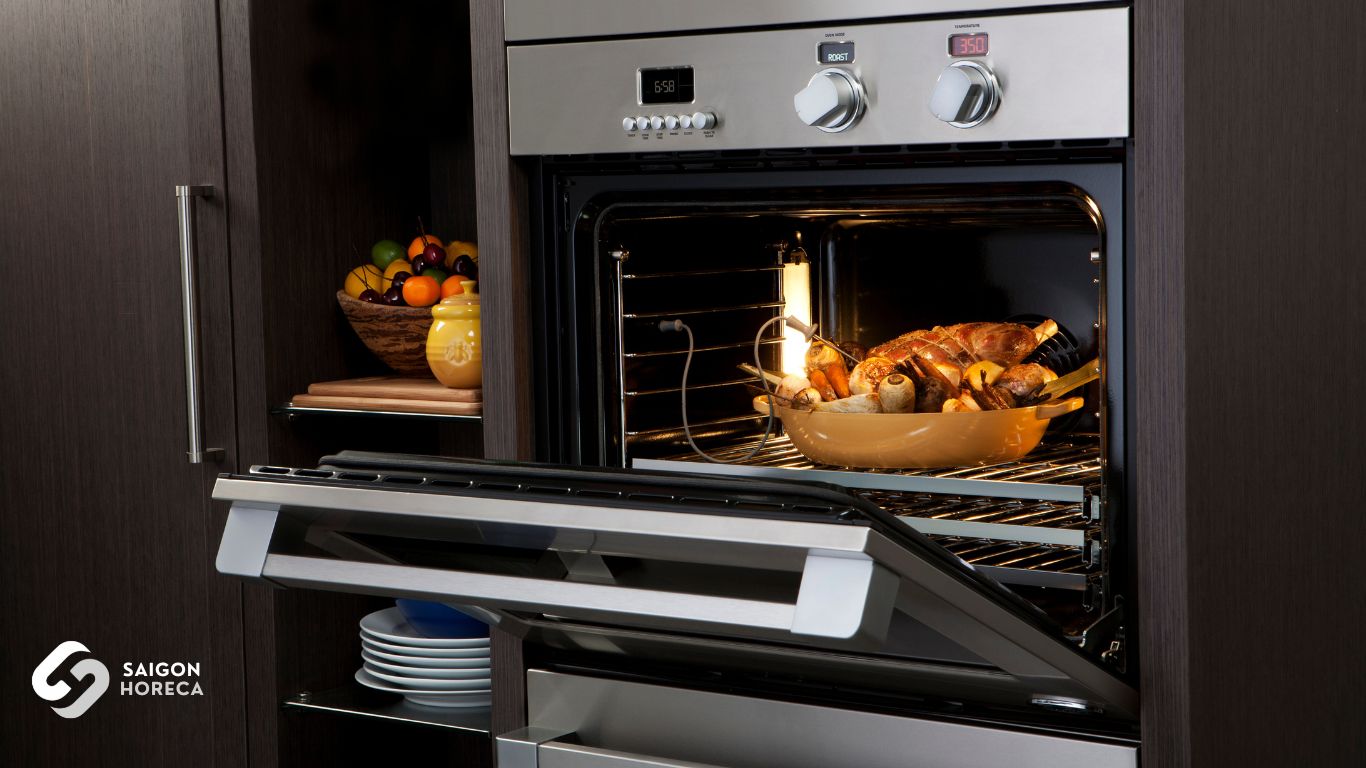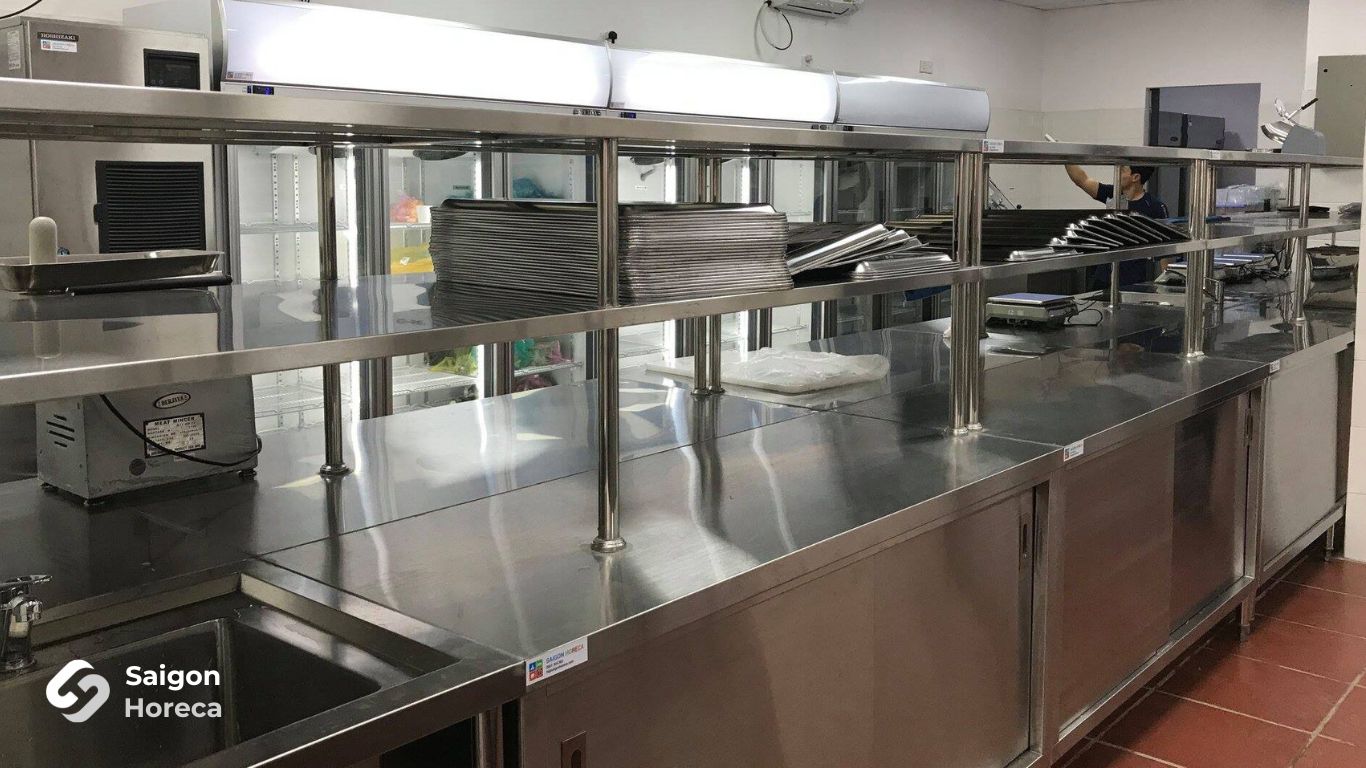Looking to elevate your grilled dishes with a Salamander Grill?...
Read More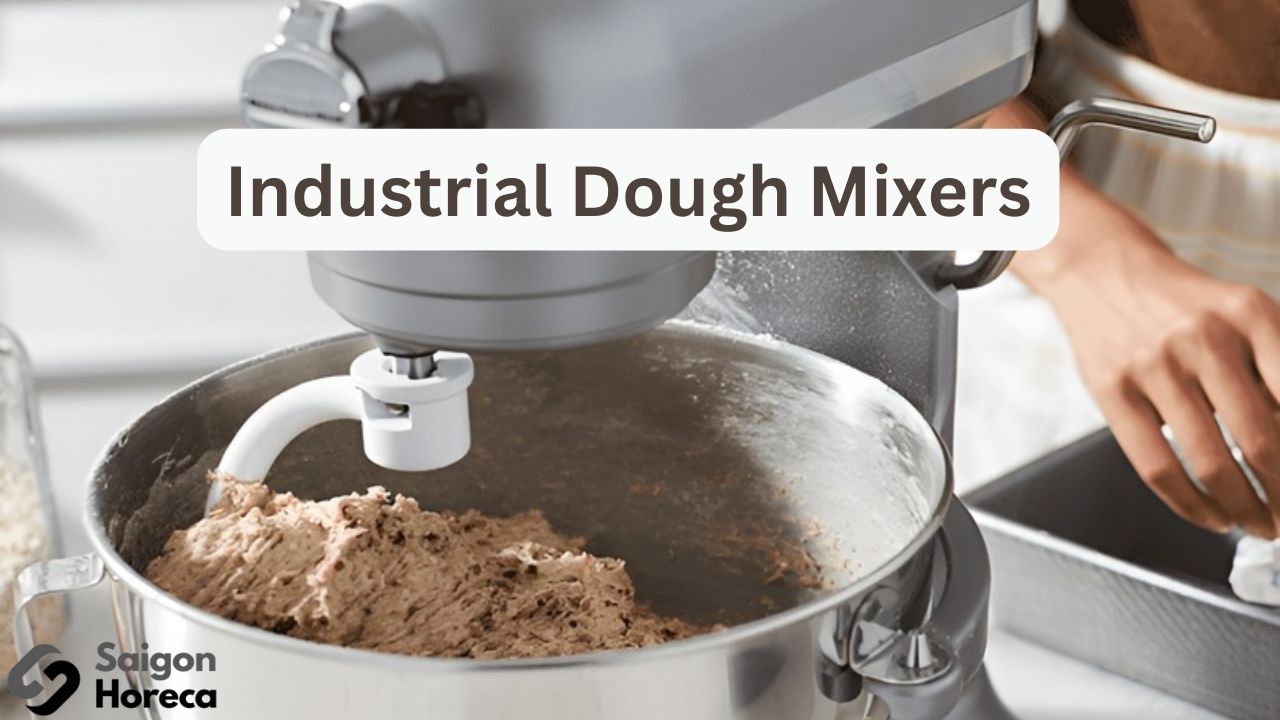

- Kitchen Equipment by Business Model
Industrial Dough Mixer: Exploring the Principles of Operation and Making the Right Choices
- November 16, 2023
In the dynamic world of the baking industry, owning a modern industrial dough mixer is not just a choice but a key to unlocking efficiency and productivity. This article will guide you through the promising realm of industrial dough mixers, exploring every aspect of their operational principles and providing detailed insights to help you make the right choices. Let’s delve into the convenience and innovation that industrial dough mixers bring to your bakery business.
In this article
What is dough mixer?
A dough mixer, also known as a dough kneader, is not just a tool but a powerful ally in the baking production process. With the ability to knead various types of wet and dry dough, a dough mixer is the secret weapon that helps chefs and bakers save time and effort while ensuring optimal product quality.
Flexibility and Convenience: A dough mixer is not only the perfect combination of capacity and large volume but also brings flexibility to the baking process. With the ability to mix a large amount of dough at once, this equipment not only helps businesses save labor costs but also optimizes the production process.
Safety and Efficiency: In the baking industry, safety is always a top priority. A dough mixer not only helps users avoid direct contact with ingredients but also ensures that the mixing process is safe and efficient.
Production Automation: With a dough mixer, businesses can easily automate the production process, thereby increasing productivity and product quality. The higher economic efficiency is what a dough mixer brings to the business.
Wide Accessibility and Application: Not only for large-scale bakeries, but dough mixers are also prevalent in bread shops, pastry shops, and even in restaurants and hotels. This is evidence of the versatility and flexibility of this equipment in the culinary industry.
With a dough mixer, the art of baking becomes not only more convenient but also reaches the pinnacle of quality and innovation. Let’s step into the abundant world of dough mixers and explore the conveniences it brings to your success in the baking industry.
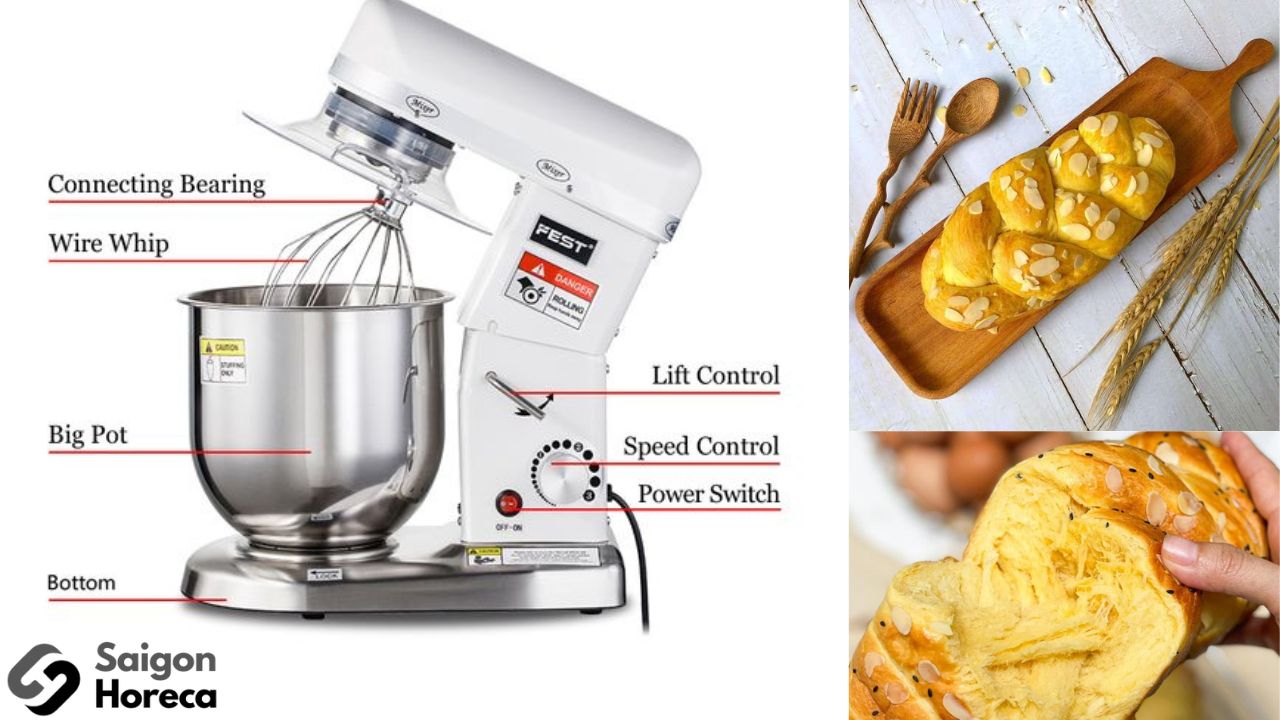

Advantages of Industrial Dough Mixers
Nowadays, in the baking industry, from bakeries to restaurants and hotels, using industrial dough mixers has become a focal point in the production process. This is not by chance but due to the outstanding advantages that this type of equipment brings.
Diverse Capacities, Abundant Choices
Industrial dough mixers come in a variety of models and designs, as well as different usage capacities. This provides flexibility for shop owners and baking businesses to choose the equipment that best suits their business scale.
Whether you want to process bread, pizza dough, sponge cake, pastries, or other special types of baked goods, industrial dough mixers can meet all kneading requirements, creating batches of evenly mixed and standardized dough.
Furthermore, dough mixing machines are not limited to baking; they can also be used to mix other ingredients, creating delicious dishes such as spring rolls, sausage, fish cakes, or sausages.
High Productivity, Time Efficiency
The kneading process used to demand professionalism and experience from bakers. However, with the support of dough mixers, this process becomes simple and quick. In just a few minutes, you can have a batch of high-quality, smooth, and evenly mixed dough. Even for special types of dough that require denser mixing, the time required is significantly reduced compared to manual methods.
Large-capacity dough kneaders have various productivity levels, ranging from 5kg to 100kg per batch, meeting the needs of baking businesses with different scales. This not only ensures the supply of a large quantity of baked goods but also helps save labor costs.


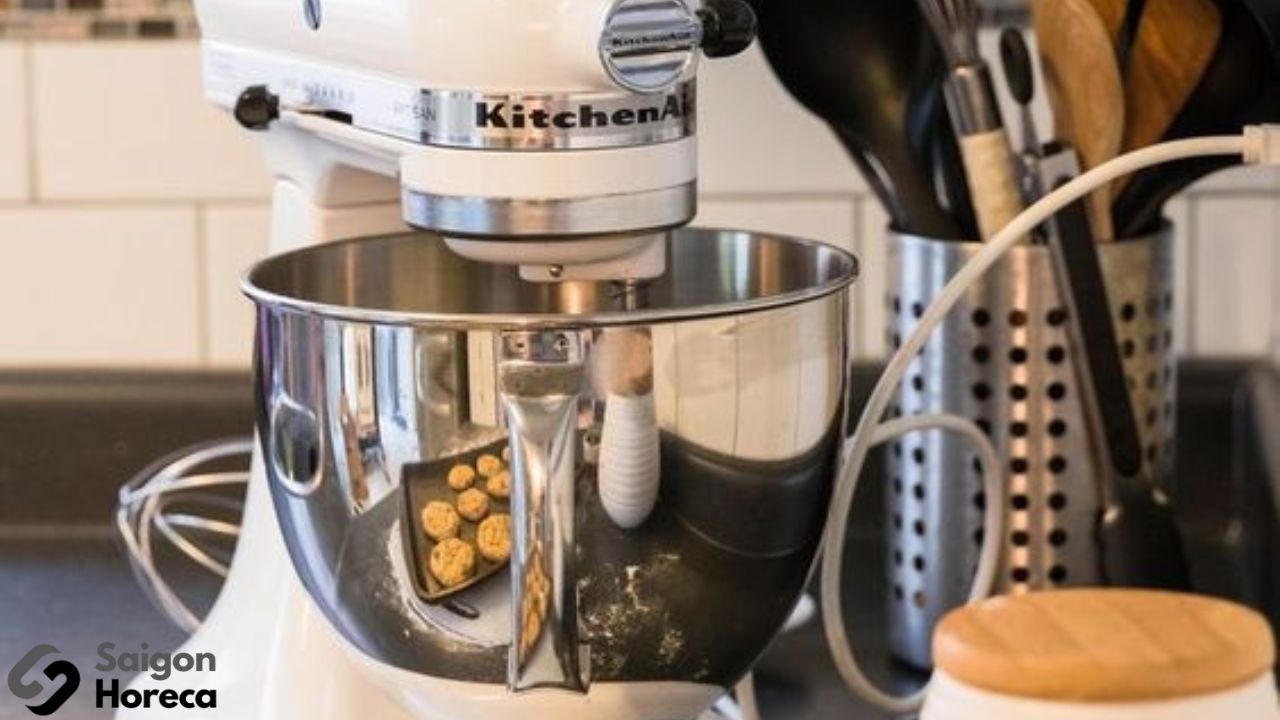

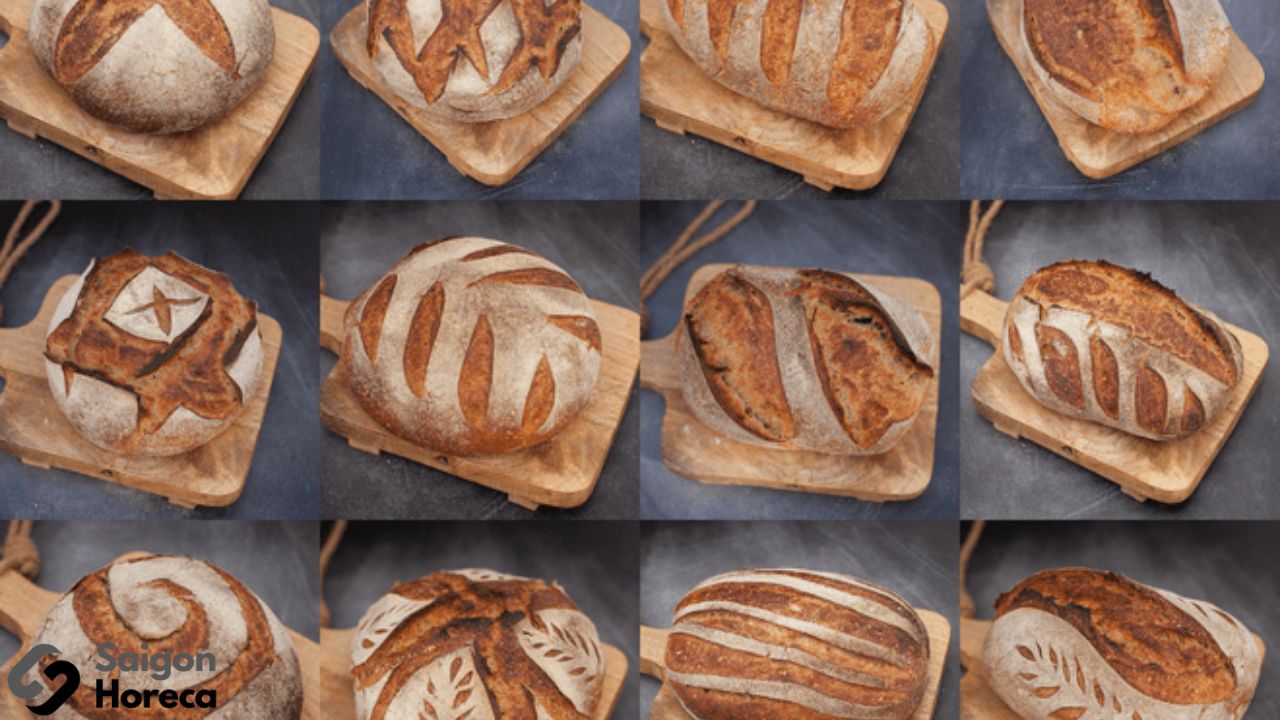

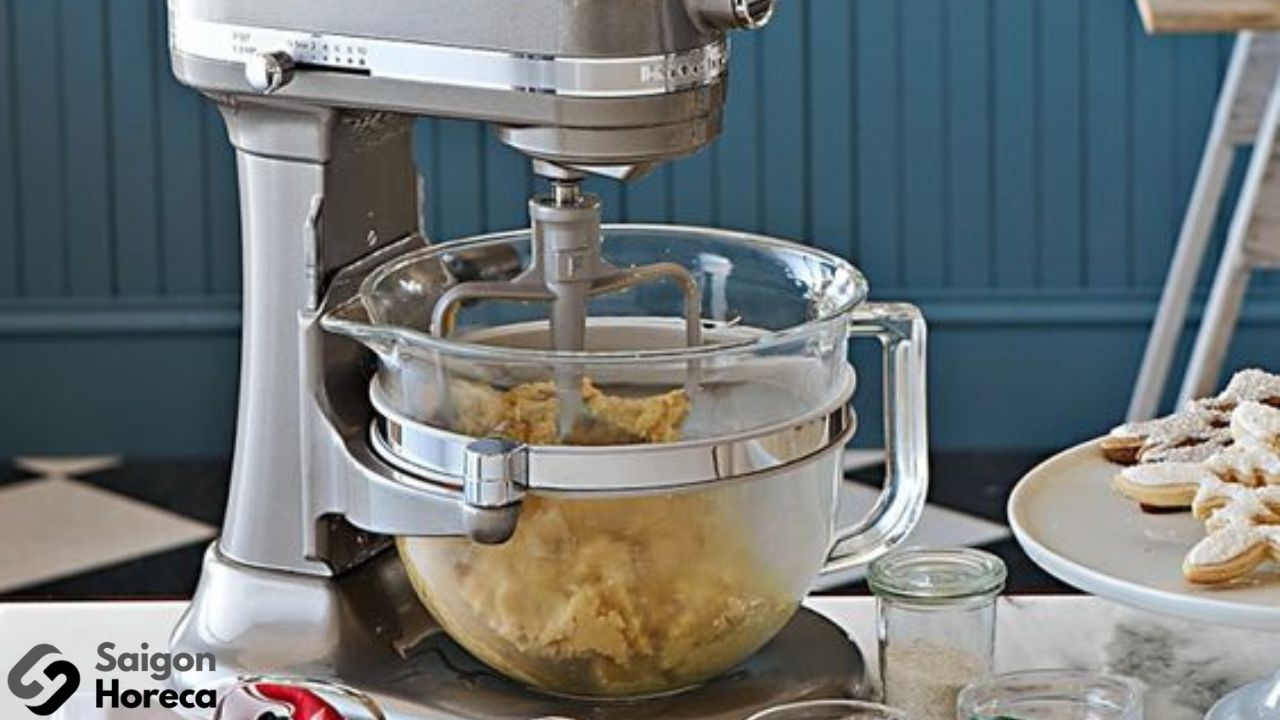

Continuous Operation, High Durability
Industrial dough mixers are typically made from high-quality stainless steel, providing excellent durability and good load-bearing capacity. This means that the machine can operate continuously, maintaining powerful performance without worrying about damage.
Stainless steel not only withstands pressure well but also has high corrosion resistance, never rusting. Thanks to this material, dough mixers always maintain a shiny and fresh appearance, creating a professional and modern installation space.
Modern industrial dough mixers also integrate advanced technology, providing powerful and durable operation. Despite these advanced features, operating the machine is incredibly simple and convenient, demonstrated through the detailed control panel that comes with the machine.
Consistent Dough Quality, Ready for Next Steps
When using a dough mixer, concerns about whether the dough meets standards, has the desired adhesion and smoothness become less important. A dough mixer provides smooth, non-clumping, and well-adhesive dough, ready for the next production steps immediately.
Moreover, with parts made from high-quality steel and stainless steel, dough mixers not only ensure food safety standards but are also easy to clean. The smooth and shiny stainless steel not only enhances aesthetics but also makes the cleaning process easier and more efficient.
Industrial dough mixers are not just a useful tool but also a reliable partner in the baking industry. With diverse capacities, high productivity, durability, and continuous operation capability, dough mixers not only help optimize the production process but also create high-quality, uniform products that meet the market’s demands.
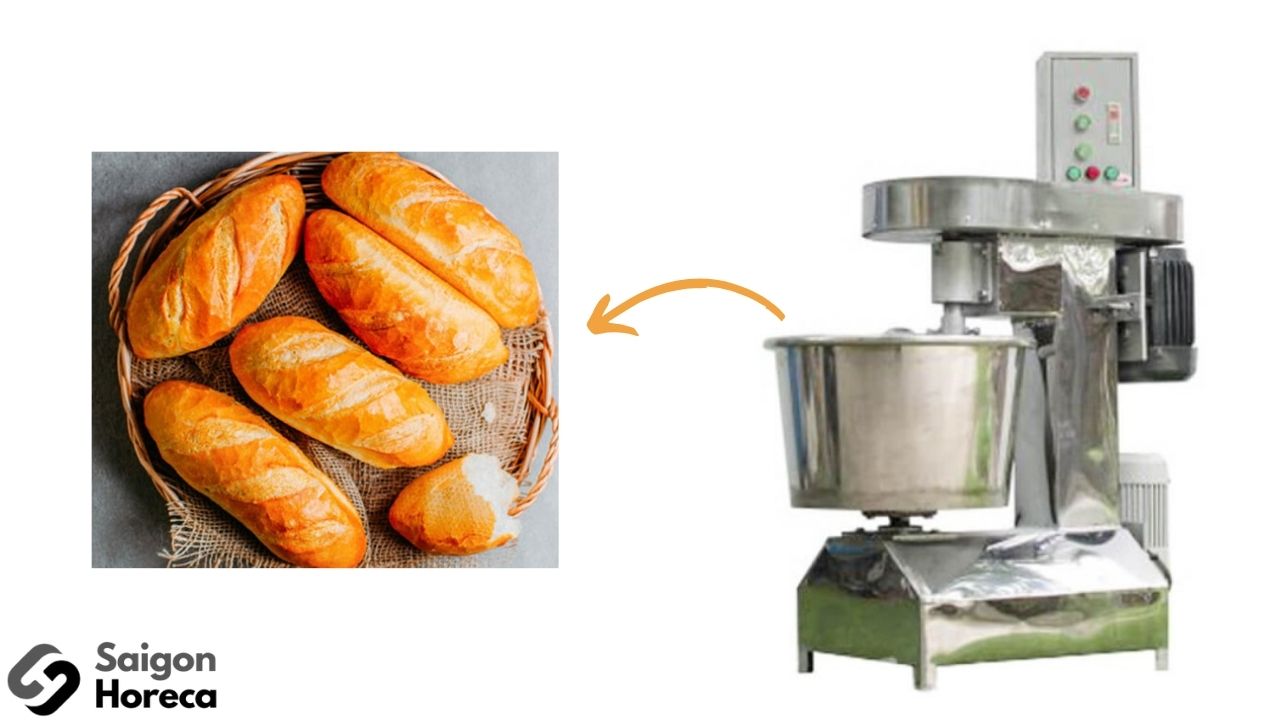

Structure and Operating Principle of Industrial Dough Mixers
When deciding to purchase an industrial dough mixer, the structure and operation of the equipment are often crucial factors that many customers are concerned about. Below is an in-depth exploration of the structure and operation of dough mixers, emphasizing simplicity, stability, and efficiency.
Simple Structure, High Efficiency
Industrial dough mixers are built with a simple yet robust structure. It includes the machine body, motor, drive shaft, mixing bowl, mixing arm, and conveyor belt, with each component designed to operate powerfully and stably.
The machine body is constructed from stainless steel, providing stability and excellent load-bearing capacity. This not only ensures smooth machine operation but also minimizes vibration and noise, creating a comfortable and efficient working environment.
Powerful Motor, Continuous Stability
The motor of the industrial dough mixer is constructed from high-quality materials and securely attached to the machine body. This ensures that the machine can operate continuously without issues related to the motor, which is particularly important in large-scale production processes at bakeries.
Mixing Bowl and Dough Hook – Safe and High Quality
Parts that come into direct contact with food, such as the mixing bowl and dough hook, are entirely made from high-quality stainless steel. This not only ensures food safety and hygiene but also helps maintain the quality of the dough throughout the mixing process.
Stainless steel has excellent corrosion resistance and durability, and it is non-stick. This helps prevent dough from sticking to machine parts, reducing material waste, and making the cleaning process more straightforward.
Efficiency and Cost Savings
An industrial dough mixer not only simplifies and streamlines the kneading process but also brings about cost savings. Using the machine reduces dough preparation time, increases productivity, and simultaneously decreases labor costs.
With a simple structure, powerful motor, and high-quality components, industrial dough mixers are not just useful tools but also reliable partners in the baking industry. The simplicity and efficiency of the machine not only help optimize the production process but also ensure food quality and safety.
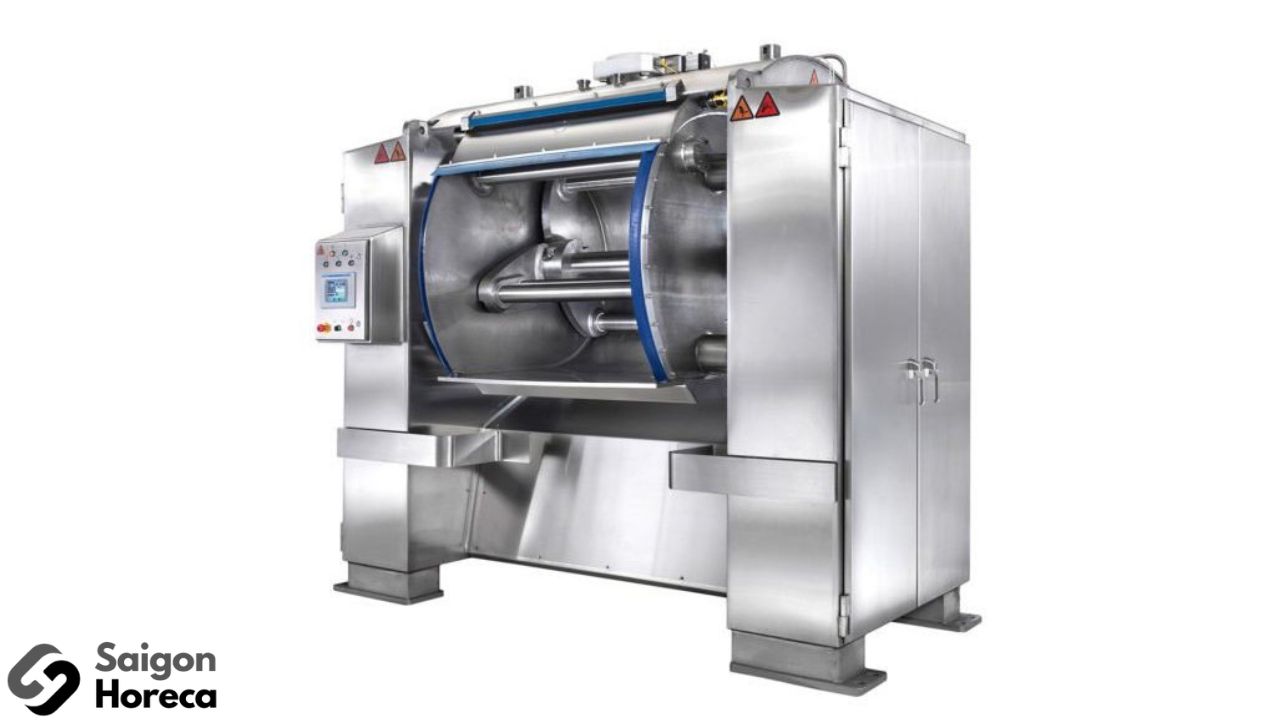

Diversification and Optimization in Choosing Industrial Dough Mixers
In today’s market, the diversity in design, capacity, volume, and features of industrial dough mixers from different brands has created numerous options to meet every customer’s needs. Although there are many criteria for classification, generally, dough mixers can be categorized primarily based on capacity and volume.
Classification Based on Capacity
1kg Dough Mixer:
Compact design, suitable for small kitchen spaces. High efficiency, able to mix 1kg of dough per batch in a short time. Affordable, commonly used in small-scale bakeries.
2kg Dough Mixer:
Mixes up to 2kg of dough per batch in less than 10 minutes. Suitable for small bakeries with limited manpower. Produces well-kneaded, smooth, and delicious dough.
3kg Dough Mixer:
Durable stainless steel construction, shiny, and long-lasting operation. Suitable for medium and small-scale bakery production. Machine prices vary slightly, meeting diverse budgets.
5kg Dough Mixer:
Large capacity, serves medium-sized businesses and most bakeries and restaurants. Optimizes productivity and saves labor costs.
10kg Dough Mixer:
Mixes a large amount of dough up to 10kg per batch. Commonly used in large-scale bakery production. Quick and significantly more efficient than manual dough mixing.
100kg Industrial Dough Mixer:
Designed for large-scale automated bakery production lines. Extremely high capacity, durable operation, and smooth performance to meet continuous work demands.
With this diversity, choosing an industrial dough mixer depends not only on production needs but also on budget and workspace. Although machine prices differ, for each type, long-term benefits and efficiency are essential considerations to ensure a wise investment.
Classification Based on Volume
When considering the volume of industrial dough mixers, consumers can find many suitable options for various production scales. Here are some types of dough mixers classified by volume to meet diverse needs.
7L Dough Mixer:
This 7L dough mixer not only has a modern and flexible design but is also easily movable, suitable for flexible baking needs. It has excellent cooling capabilities and a powerful motor to ensure high performance and longevity. With the ability to mix 2 kg of dough per batch, this machine multitasks with 3 mixing speeds and 3 beating sticks, serving various needs from baking to egg beating and meat mixing.
10L Dough Mixer:
With a 10L capacity, this machine can mix 2.5 kg of dough per batch. It comes with 3 mixing sticks with diverse functions, from mixing dough to mixing cake filling, beating eggs, and mixing meat. The 10L dough mixer operates powerfully and durably, optimizing productivity for medium and small-scale bakery production.
20L Dough Mixer:
The 20L capacity device is designed with a large mixing bowl to meet the demand for mixing up to 5-8 kg of dough per batch. Flexible mixing levels help adjust the kneading speed as required, serving a variety of cake types. With accompanying accessories, the machine can beat eggs, whip cream, and mix meat, expanding creative possibilities in the kitchen.
30L Dough Mixer:
With a large capacity and powerful performance, the 30L dough mixer can mix from 6-12 kg of dough per batch. This is an excellent choice for confectionery factories and medium to large-scale shops. With modern technology and high-quality construction, the machine operates smoothly and durably, ensuring high economic efficiency.
The diversity in volume not only enhances production capacity but also increases flexibility and creativity in the baking process. In this way, each business can choose a dough mixer that suits its specific needs, optimizing every aspect of the baking industry.
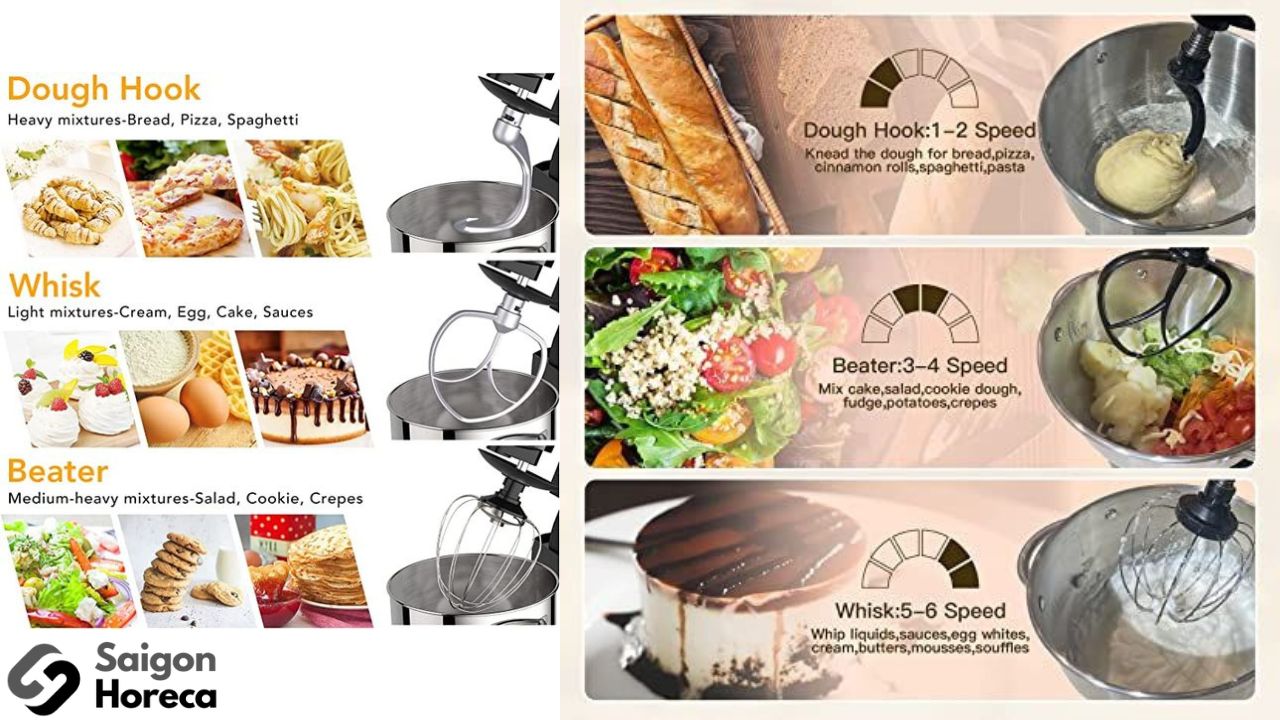

Differentiating Between Dry Dough Mixers and Egg Mixing Dough Mixers
Dry dough mixers and egg mixing dough mixers are two essential devices in the baking production process, serving different purposes. Dry dough mixers are designed to knead and mix dry ingredients such as flour, leavening agents without the addition of liquids. This equipment typically includes a mixing bowl, a motion shaft, and a motor, serving to create a cohesive and evenly mixed dough.
In contrast, egg mixing dough mixers not only have the function of mixing dough but also combine the ability to beat eggs and mix liquid ingredients. This helps create a light and smooth texture for sweet baked goods such as cupcakes, bread, and cookies. This machine usually comprises a mixing bowl, a powerful motor, and beating attachments, with adjustable mixing speeds.
With the differences in functionality and structure, the choice between a dry dough mixer and an egg mixing dough mixer depends on the specific needs of the baking process and the type of baked goods being produced.
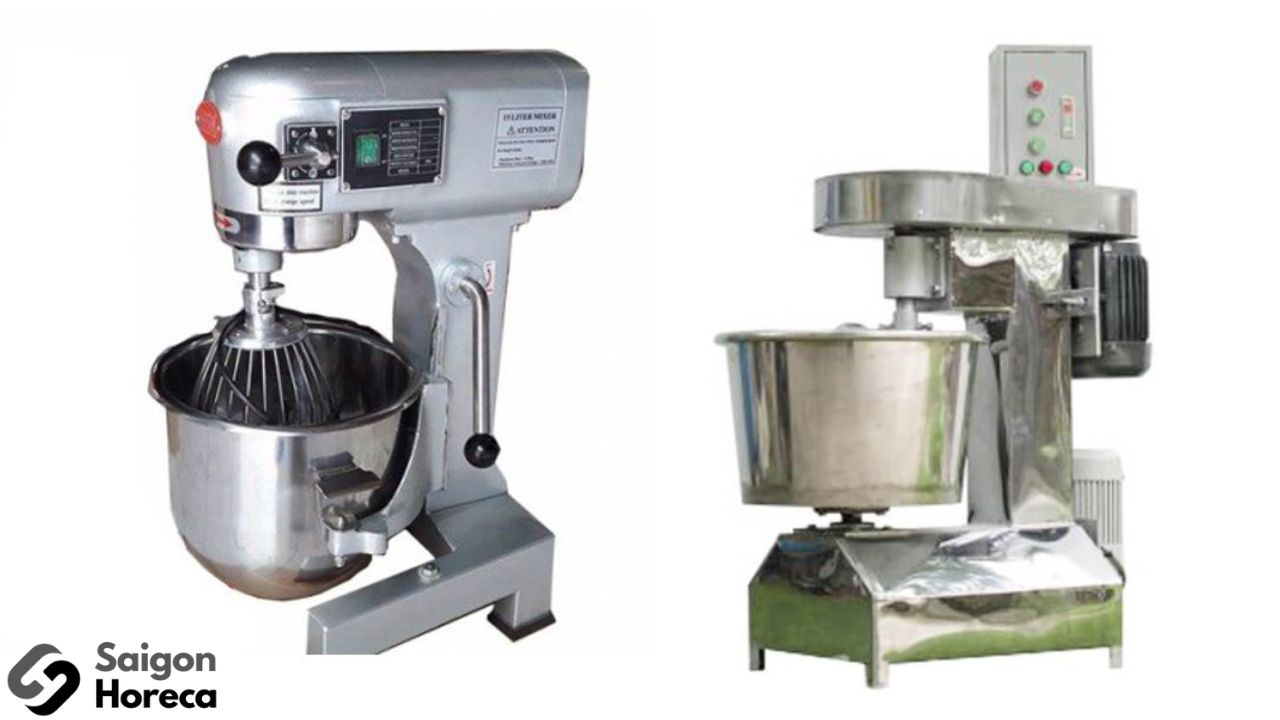

Which Type of Dough Kneader is the Best to Buy?
The diversity in the dough kneader market opens up a wide range of options but also poses a challenge for buyers in finding suitable equipment. Choosing the wrong type of dough kneader can lead to unattainable performance and impact production. To assist customers in this process, we introduce some highly-rated types:
Horizontal Dough Mixer
A dough mixer with a horizontal design and dual spiral mixing arms is commonly found in medium to large-scale bakeries. With the ability to mix evenly and quickly, the machine helps achieve a smoother dough while minimizing the accumulation of ingredients in the corners of the mixing tub. The robust stainless steel frame allows the machine to handle large dough masses, even up to 100kg per kneading.
The operation of horizontal dough mixers is designed to be simple and convenient, ensuring a high level of safety for users. The mixing capacity of the machine can be 3-4 times higher than manual methods, providing economic efficiency and labor cost savings for businesses.
Berjaya Dough Mixer
Berjaya, a brand from Malaysia, has built a reputation in the field of industrial kitchen equipment and baking for over 40 years. Committed to international quality, Berjaya’s dough mixers not only demonstrate durability and high performance but also offer diversity in capacity and power. With a modern and professional design, Berjaya is not just a choice for businesses but also a guarantee for success in the baking production process.
Multipurpose Dough Mixer
A multipurpose dough mixer is a flexible choice for bakeries and food production facilities. With the ability to perform various tasks, from mixing sweet dough, kneading bread dough, pizza dough, baozi dough to beating eggs, whipping cream, mixing meat, and even blending pharmaceuticals and cosmetics, this machine provides convenience and versatility in the production process.
With a multipurpose dough mixer, businesses can optimize production capacity without investing in multiple devices. This helps save workspace and reduce investment costs. The flexibility of the machine also allows for innovation in products and processing, enabling businesses to adapt flexibly to market demands. The multipurpose dough mixer is a reliable partner for improving efficiency and diversifying products.
Considerations When Purchasing Dough Kneaders for Baozi and Bread Making
This is a concern for many customers when choosing to buy a machine. There are many factors related to the quality of the product that you need to pay attention to, such as capacity, brand, origin, design, material, mixing speed, and durability of the equipment. Therefore, you need to carefully consider these factors before making a choice to avoid mistakenly purchasing low-quality products.
Brand
It is advisable to choose reputable and well-established brands in the production and distribution of dough kneading machines, specifically, and baking equipment in general. This helps avoid buying counterfeit or fake products, which may break down shortly after operation. Every type of machine must have complete documentation, information about the origin of the product, especially transparent pricing on the website.
Capacity
You should choose a machine with a capacity that matches the daily production requirements. If you only run a small shop, it is recommended to choose a machine with low capacity to save electricity costs. Conversely, if you own a confectionery factory, you should look for machines with high capacity to meet the production schedule and ensure both the quantity and quality of the output.
Construction of the Bread Dough Mixer
The construction of the machine will include design and material. To ensure long-term use and operational performance, prioritize products with a sturdy design and made from durable, safe materials such as stainless steel 304 or stainless steel.
Speed
The mixing speed of the machine will determine the texture, flavor, and quality of the final dough product. Therefore, the mixing speed of the machine is an important factor to consider before deciding to buy. Since different types of bread have different requirements for the dough, prioritize choosing a machine with multiple integrated mixing speeds for maximum usability.
Saigon Horeca - A Trustworthy Address for Buying Quality Bread Dough Mixing Machines
Monday - Friday
from 8h00 to 18h00
Số 40 Đường số 6, KDC Melosa Khang Điền, Phú Hữu, HCM.
Contact anytime
In the context of the rapidly growing culinary and food...
Read More
